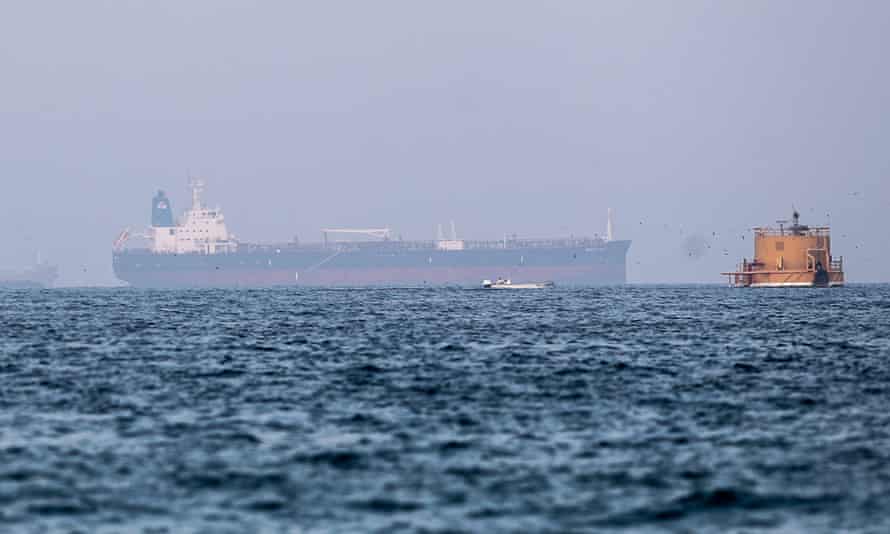Panama-registered Asphalt Princess was reportedly seized by eight to nine armed individuals

Iranian-backed forces are suspected of being behind the seizure of a tanker off the coast of the United Arab Emirates, after Britain’s maritime trade agency reported a “potential hijack” in the area on Tuesday by eight to nine armed individuals.
Maritime security sources identified the vessel as the Panama-flagged asphalt tanker that was reportedly intercepted in an area in the Arabian Sea leading to the strait of Hormuz, through which about a fifth of the world’s seaborne oil exports flow.
Maritime security analysts at Dryad Global and Aurora Intelligence later named the endangered ship as the Asphalt Princess travelling to Sohar, a port on Oman’s northern coast.
In a statement, the UK Foreign Office said it was “urgently investigating an incident on a vessel off the UAE coast”. A spokesperson for the US state department said it was “too early to offer a judgment” on the incident.
Iran’s Revolutionary Guards denied that the country’s forces or allies were involved, saying the incident was a pretext for “hostile action” against Tehran, Iranian state television said on its website.
“According to information from security sources, Iran’s armed forces and all branches of the Islamic Resistance in the Middle East have nothing to do with the incident in the Gulf of Oman,” the Guards said in a statement carried by the website.
The statement said the incident was an attempt by western countries and Israel “to prepare the public opinion of the international community for hostile action against the honourable nation of Iran”.
The latest incident followed an attack last week on an Israeli-managed tanker off the Omani coast that killed two crew members and was blamed on Iran by the United States, Israel and Britain. Iran denied responsibility.
Iran’s foreign ministry said reports of security incidents involving several ships near the UAE coast on Tuesday were “suspicious” and warned against any effort to create a “false atmosphere” against Tehran.
“The reports on the occurrence of successive security incidents for ships in the Persian Gulf and the Gulf of Oman is completely suspicious,” a ministry website quoted spokesperson Saeed Khatibzadeh as saying, adding: “Iran’s naval forces are ready for help and rescue in the region.”
First intimations of an incident emerged on Tuesday afternoon when a warning notice was issued by the British military’s United Kingdom Maritime Trade Operations (UKMTO), which notified ships that “an incident is currently under way” – later upgraded to a “potential hijacking”.
An Oman Royal Air Force Airbus C-295MPA, a maritime patrol aircraft, was flying over the area, according to data from Flightradar24.com.
The initial warning emerged amid contradictory claims in different local media that up to four ships had reported issues. Four oil tankers announced around the same time via their automatic identification system trackers that they were “not under command”, according to MarineTraffic.com.
It was not clear, however, of the significance of those alerts or even if they were related, with one of the ships later moving again.
The US military’s Middle East-based Fifth Fleet and the British defence ministry did not immediately return calls for comment. The Emirati government did not immediately acknowledge the incident.
The event comes just days after a drone struck an oil tanker linked to an Israeli billionaire off the coast of Oman, killing two crew members. On Monday, Iran said it would respond to any threat against its security after the United States, Israel and Britain blamed Tehran for the attack, which marked the first known assault to have killed civilians in the years-long shadow war targeting commercial vessels in the region.
Iran denied any role in the incident, though Tehran and its allied militias have used similar “suicide” drones in attacks previously. Israel, the US and UK vowed a “collective response” to the attack, without elaborating.
The UKMTO warning notice, based on a third-party source, advised vessels to exercise extreme caution in the area, about 61 nautical miles east of Fujairah.
The UKMTO was set up by the Royal Navy in 2001 initially to coordinate and exchange information with merchant traffic in the Arabian Sea to help counter Somali piracy.
